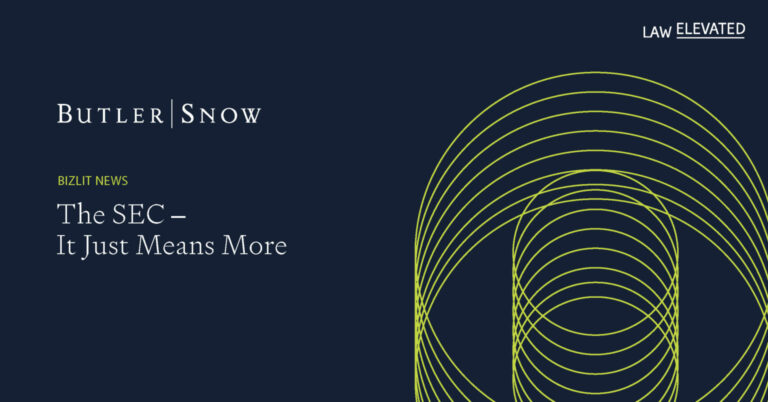The Securities and Exchange Commission (“SEC”) was established by the passage of the Securities and Exchange Act of 1934 following the stock market crash of 1929.[1] The Act gave the newly formed SEC power to regulate the securities industry in an effort to protect investors and capital from abuse in the markets. Fresh in everyone’s mind at the time was the 1929 crash which caused banks to close, widespread bankruptcy, and unemployment ultimately leading to the Great Depression.[2]
Almost 100 years later, the SEC finds itself continuing to stretch for the outer limits of its charter mission – to protect investors and capital – in today’s world. As shown in the recent spat with Elon Musk,[3] the co-founder and CEO of Tesla, and the newly released Climate Disclosure Proposal,[4] the SEC is continuing to expand its authority over companies’ financial statements and disclosures. Today’s technology and trends, which include social media platforms and ways to measure climate risks, create new challenges for the SEC and companies. A company can make public statements regarding its financial status, for example, over a Twitter account. The extent to which the SEC has authority over statements made on Twitter by individuals is being challenged by Elon Musk in federal court.[5]
In 2018, Elon Musk and Tesla agreed to a settlement with the SEC over what the SEC argued was stock manipulation due to statements made by Musk on his Twitter account regarding the potential privatization of Tesla.[6] The SEC sued Musk and Tesla for fraud in federal court over these statements.[7] Musk has since asked the Court to terminate the consent decree he entered into arguing that the SEC is using enforcement of the agreement to stifle his free speech and subject him to endless investigations regarding his statements on Twitter.[8] Tesla’s settlement agreement with the SEC required the appointment of a securities attorney to vet its senior officers’ social media communications and Musk agreed to the oversight.[9] Since Musk agreed to this requirement it will be difficult for him to convince the Court to void his settlement agreement over it, but he was successful in 2019 in getting the SEC to negotiate more specific language about the subject matters for which his tweets would be vetted.[10] The SEC had originally wanted all of his public communications to be vetted.[11]
Climate risk metrics are also a new and advancing technology. Proponents of the new climate disclosure proposal released by the SEC argue the proposed disclosures would help investors with crucial information regarding companies’ climate risks. SEC commissioners in favor of the new rule assert the SEC has broad authority to require disclosure that is in the public interest and for the protection of investors.[12] The SEC announced that the proposed rule would require registrants to disclose information about climate-related risks that are likely to have a material impact on their business or financial condition and to specifically disclose their greenhouse gas emissions.[13] The disclosures in the proposed rule are broad and include, for example, the environmental impact of the emissions of larger companies’ suppliers and customers which dissenters of the proposed rule argue are difficult to measure.[14] The disclosures required by the proposed rule would add significant costs and risks to the financial reporting of companies.
The Twitter spat with Elon Musk should not be dismissed as the problems of a flamboyant CEO. A similar suit could be filed by the SEC for public statements made by any senior company official, even in a more traditional setting. The monitoring of individual social media accounts and forced disclosure of potential impacts on the climate make clear that the SEC is embracing new challenges created by emerging technologies and trends in our society and asserting authority to regulate them – even if their relationship to financial reporting seems more remote. SEC rules and regulations will continue to mean more to Boards of Directors and leaders of companies as we approach the 100-year anniversary of the establishment of the commission and dedicating resources to keeping up with these changes is a must for companies in today’s world.
[1] SEC: Securities and Exchange Commission, History.Com Editors, December 6, 2019, www.history.com/topics/us-government/securities-and-exchange-commission.
[2] Id.
[3] SEC v. Elon Musk, case number 1:18-cv-08865 (SDNY) and SEC v. Tesla Inc., case number 1:18-cv-08947 (SDNY).
[4] Securities and Exchange Commission, 17 CFR 210, 229, 232, 239, and 249, The Enhancement and Standardization of Climate-Related Disclosures for Investors, March 21, 2022.
[5] SEC v. Elon Musk, case number 1:18-cv-08865 (SDNY).
[6] SEC v. Elon Musk, case number 1:18-cv-08865 (SDNY) and SEC v. Tesla Inc., case number 1:18-cv-08947 (SDNY).
[7] Id.
[8] Musk Asks Court to Scrap His Deal with the SEC, Dean Seal, March 8, 2022, www.law360.com/compliance/articles/1471712.
[9] Musk to Pay $20M in Settlement Over Going-Private Tweets, Jon Hill, September 30, 2018, www.law360.com/articles/1087773.
[10] The court has approved Elon Musk’s new agreement to let lawyers oversee his Tesla tweets, Sean O’Kane, April 30, 2019, www.theverge.com/2019/4/26/184847551/elon-musk-sec-fraud-tesla-tweets-contempt-agreement.
[11] Id.
[12] SEC Unveils Long-Awaited Climate Disclosure Proposal, Al Barbarino, March 21, 2022, www.law360.com/compliance/articles/1472278/sec-unveils-long-awaited-climate-disclosure-proposal.
[13] SEC Proposes Rules to Enhance and Standardize Climate-Related Disclosures for investors, U.S. Securities and Exchange Commission, March 21, 2022, 2022-46, www.sec.gov/news/press-release/2022-46.
[14] SEC Unveils Long-Awaited Climate Disclosure Proposal, Al Barbarino, March 21, 2022, www.law360.com/compliance/articles/1472278/sec-unveils-long-awaited-climate-disclosure-proposal.
